Report on “Meet the Ambassador: British High Commissioner”
05 September 2022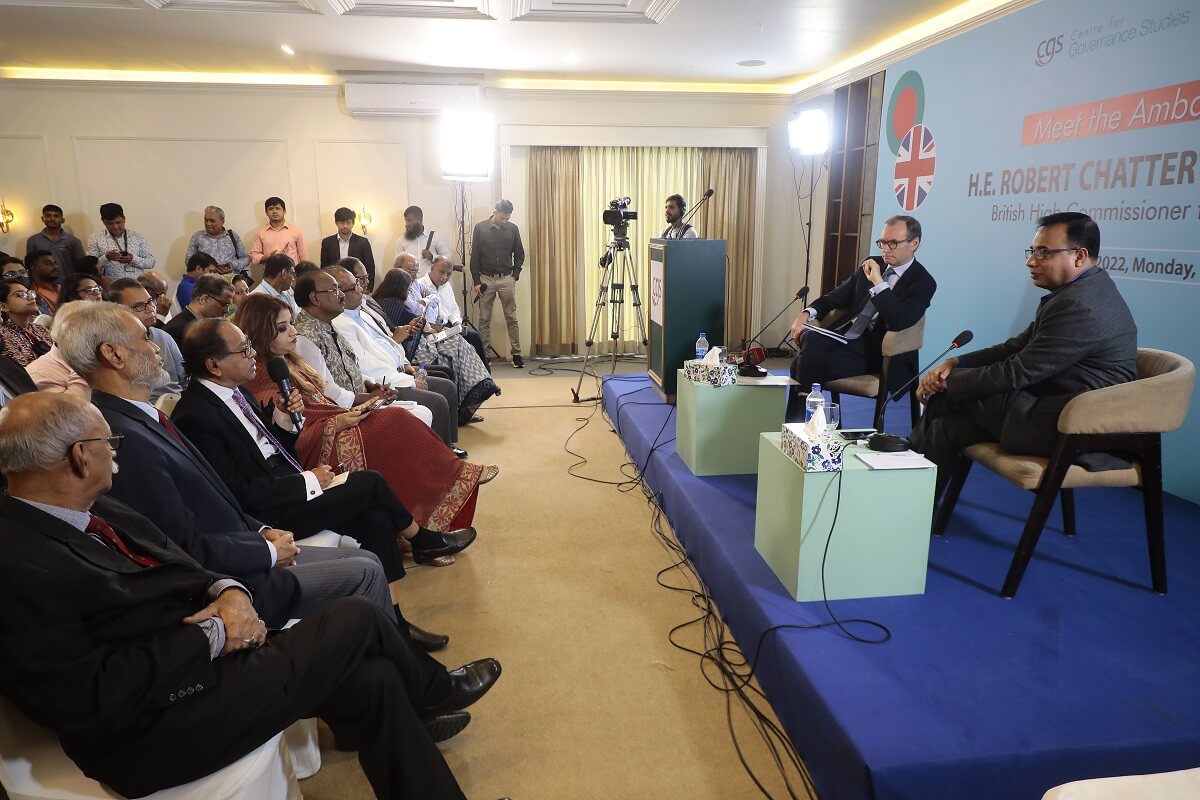
On Monday, 22nd August a program was hosted by the Centre for Governance Studies (CGS) in collaboration with Friedrich-Ebert-Stiftung (FES) Bangladesh titled “Meet the Ambassador”. The event took place in a hotel in Dhaka and was the second of a series of “Meet The Ambassador” programs where ambassadors from various nations and international organizations are invited to talk to members of Bangladesh’s civil society, academicians, journalists, businessmen, and politicians from both ruling and opposition parties. The British High Commissioner to Bangladesh, Robert Chatterton Dickson, was the guest of honor at the second event, where he gave a keynote speech and then answered various questions from the audience regarding different aspects of UK and Bangladesh relation and the South Asian geopolitics. 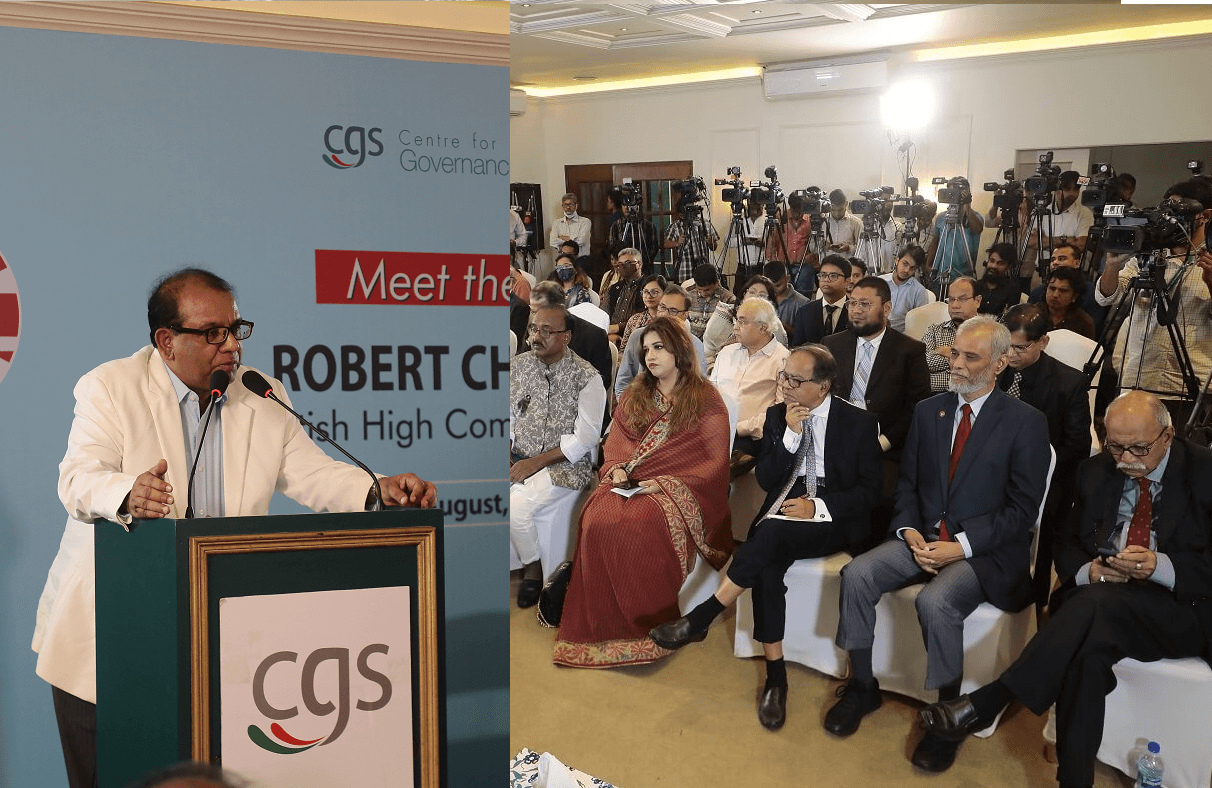
The discussion commenced with an opening speech from the Chairman of CGS and Chairman of the National River Conservation Commission, Dr. Manjur A. Chowdhury, followed by FES Bangladesh’s Programme Coordinator Shadhan Kumar Das. The Executive Director of CGS, Zillur Rahman, moderated the conversation with the High Commissioner.
Manjur A Chowdhury welcomed everyone on behalf of CGS. He asserted that Bangladesh or the Bengali people have a long-standing tie with the United Kingdom. This nation, formerly colonial master, is now a development partner. He emphasized our cooperation on the basis of equality, respect for shared sovereignty, and mutual interest. More than half a million people of Bangladeshi origin reside in the United Kingdom. Numerous people in British society have achieved great success. He expressed greater outcomes in partnerships with countries like the United Kingdom.
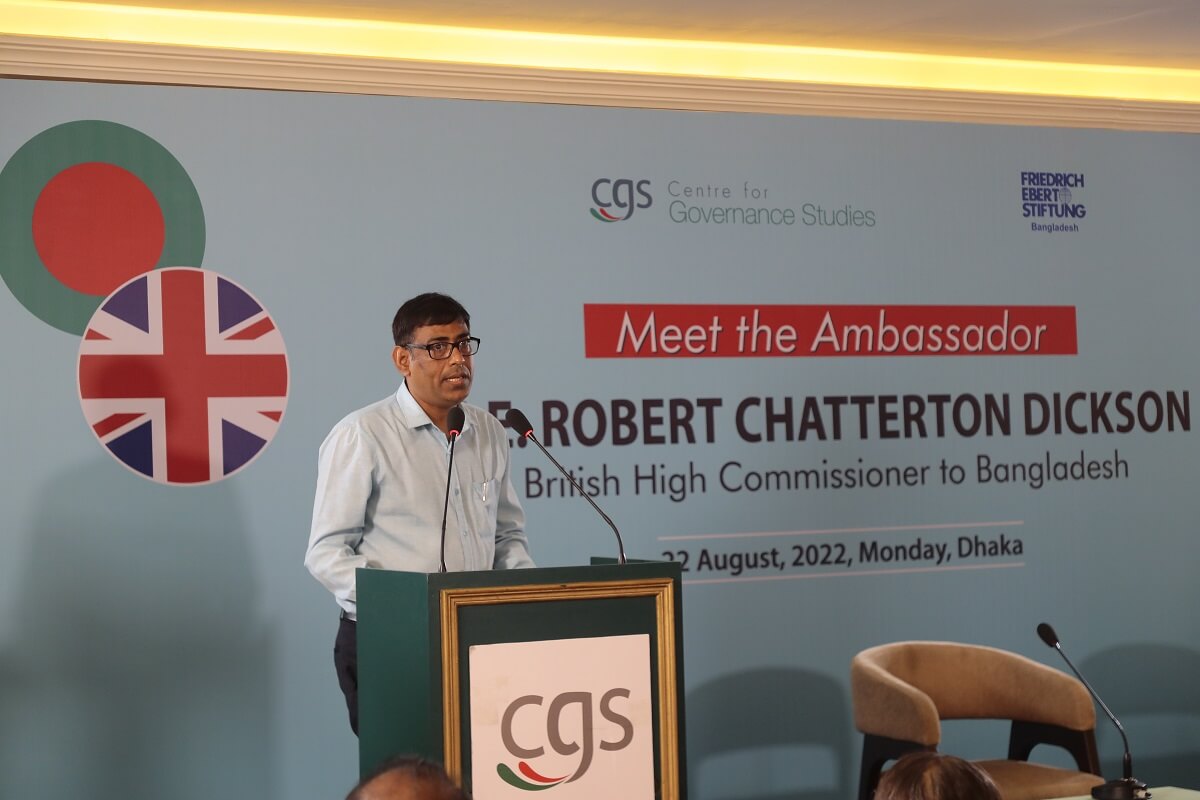
Shadhan Kumar Das gave his welcoming speech on behalf of the Resident Representative of FES Bangladesh, Mr. Felix Kolbitz, by pointing out that “Meet the Ambassador” events are intended to serve as a platform for sharing dialogues and discussing about existent and future prospects in a country like Bangladesh. The goal of the ambassador's meetings, according to him, is to discuss bilateral ties and future growth prospects for Bangladesh. United Kingdom and Bangladesh are marking fifty years of diplomatic relations. He stated that both the countries must evaluate the quality of the bilateral relationship and explore possible future relations.
When giving keynote speech, Robert Chatterton Dixon, the British High Commissioner to Bangladesh expressed his delight regarding this year being the 50th anniversary of diplomatic ties between the UK and Bangladesh. In addition, it has been seventy-five years since the United Kingdom relinquished direct control over the Indian subcontinent. The Bangladeshi High Commission is commemorating the 51st anniversary of the so-called "Brit-Bangla bond" between the United Kingdom and Bangladesh. Using the rich history shared by the two countries, he also stated that they have been working very hard to strengthen all existing connections. He insisted that The UK is getting more involved in the area to help solve some of the most important problems in the world, like climate change and maritime security.
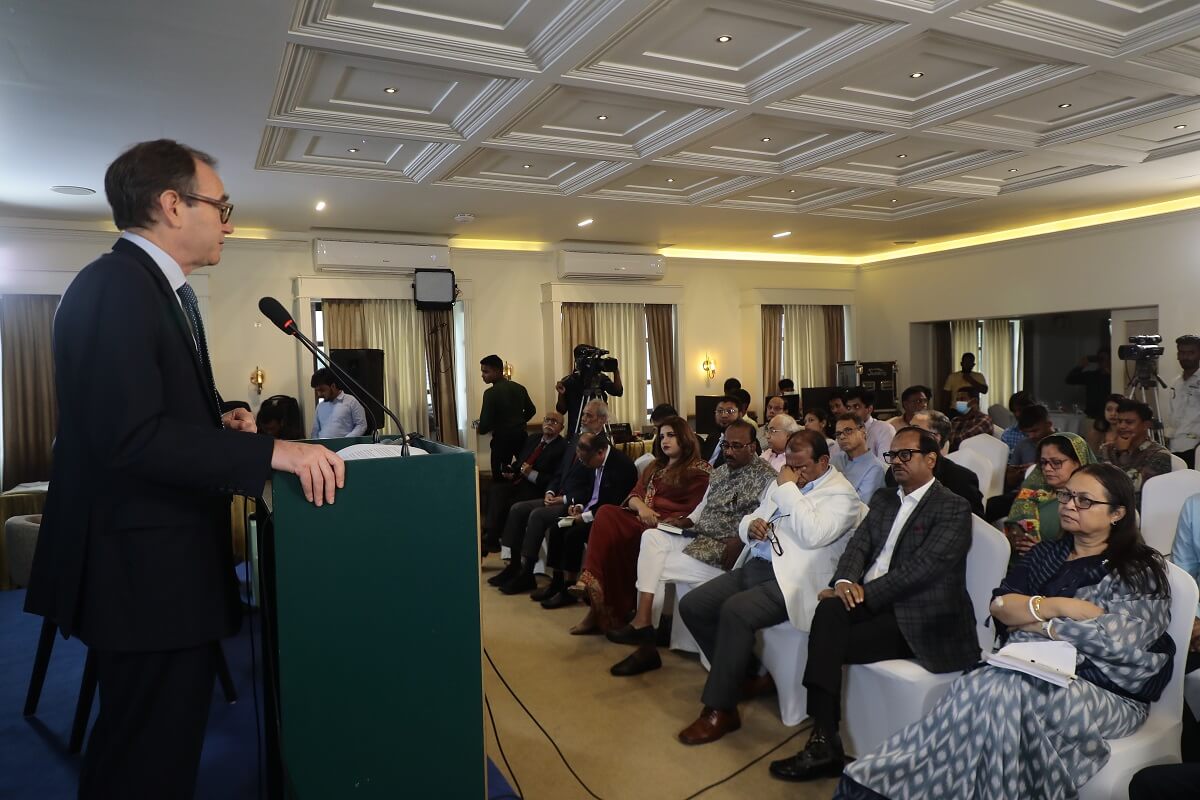
The United Kingdom is Bangladesh's second-largest export market in Europe. In terms of investment, he mentioned that his country is now the second-largest investor in Bangladesh.
As high commissioner to Bangladesh, he feels it will be essential to maintain an economic climate that promotes fair and unrestricted trade between the two countries. He would like to see universities from the United Kingdom be able to offer higher education in Bangladesh. According to him, institution quality is the most important factor in a country's ability to become a middle-income nation, and Bangladesh has room to improve its institutions' quality.
He appreciated that considerable members of the two largest parties, as well as several other political parties of Bangladesh were present there, which had lifted his hopes for a free and fair election. In his keynote speech and throughout the event, the High Commissioner stated that the upcoming change in Prime Minister in the UK would not shift UK’s geostrategic focus from the Indo-Pacific region. He went on to state that Bangladesh relations between Bangladesh and the UK are very strong and is hopeful that it will continue to grow stronger in the future. Other important issues highlighted by the HC included matters of the Rohingya refugee crisis, trade, security, climate change, and post-Covid economic recovery as the important agendas. He was ecstatic that they were able to send 282 officers to observe a military exercise between American and Bangladeshi forces. The UK-Bangladesh climate partnership, which was launched in January 2020, is bolstering collaboration on all of the most important climate-related challenges.
The most talked about topic during the conversation was regarding the repatriation of the Rohingya people back to Myanmar. The HC readily admitted that there is no quick and easy solution to the current problem and ensured that the UK would continue to provide Bangladesh with funding, as well as advocate for the issue in the UN Security Council. According to the HC, Rohingya repatriation is a shared goal between Bangladesh and UK. In the meantime, the HC suggested that Bangladesh find a way to incorporate training and education among youths in the refugee camps to curb criminal activities, as well as allow the displaced population to more easily reincorporate into Myanmar once repatriation starts.
During the conversation phase with the moderator Zillur Rahman, the High Commissioner stated that Bangladesh is a staunch supporter of the international system, especially through its commitment to international peacekeeping. Its performance over the past 50 years has been founded on a growing capacity for international commercial competition. The relationship between Bangladesh and the United Kingdom is in excellent condition.
He anticipated that global policy will continue to be predicated on the indo-pacific tilt or integrated review. According to him, exports from Bangladesh to the United Kingdom are at record levels and there are no signs of a slowdown. The garment industry accounts for 85 percent of Bangladesh's exports, and it would be desirable if other industries could match and replicate the success of the garment industry. He believes that quality is the key to a middle-income nation's success.
According to the High Commissioner, the agreement between the two countries is not a fundamental re-alignment but rather a deepening of existing defense and security partnerships. It is predicated on a sovereign Australian desire to have the capabilities it considers necessary to ensure its own security in the rising, increasingly competitive pacific environment of the twenty-first century.
Regarding the relationship with Bangladesh, he remarked that British investors are currently the second largest investors in Bangladesh. Additionally, he stated that British international investment had increased by a factor of three. He alleged that his country is interested in potential in industries such as healthcare, green energy, and agricultural technology. He has worked diligently to attract more fresh private sector investments from the United Kingdom to Bangladesh. Regarding the conversion of the enormous size, he considered there was still an issue that needed to be solved. According to him, the market's growth is extremely amazing, but the real investment procedure might be quite lengthy.
Speaking on the current global inflation and the rise of commodity prices, the HC complimented Bangladesh’s RMG exports, which were still quite significant despite the global economic downturn. He believes that the current level of inflation is a short-term problem, and the economies of both the UK and Bangladesh should subside in the coming days. According to the HC, Bangladesh’s RMG export plays a key role in the UK’s local market and market policies. He also emphasized that Bangladesh’s capacity to provide RMG at internationally competitive prices while still ensuring adequate labor and environmental protection is the main appeal of the country’s export to foreign buyers. The HC, however emphasized that it is important for Bangladesh to diversify its export portfolio as the RMG market is particularly vulnerable to shifts in consumer demand.
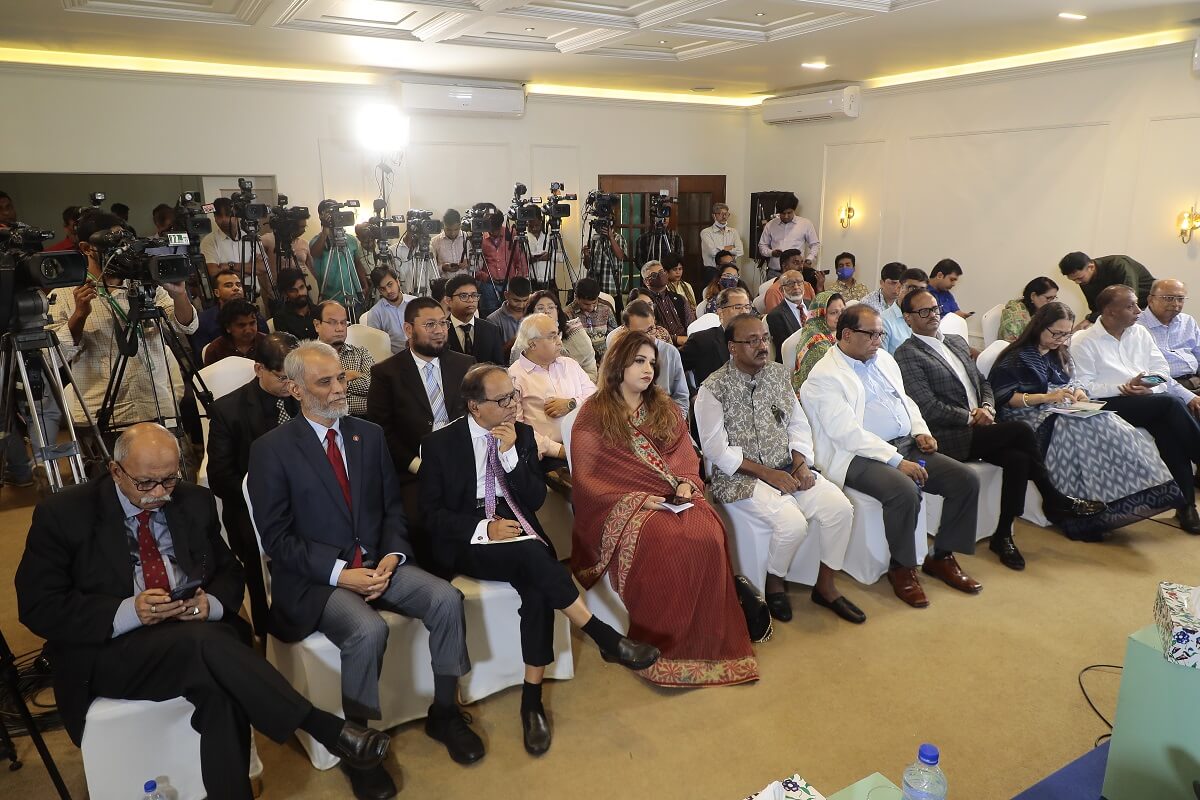
Regarding FDI and the current level of UK investment in Bangladesh, the HC highlighted that currently, there are large British corporations such as HSBC, BAT, and Unilever that are playing a big role in Bangladesh’s economy. He expressed interest in increasing the level of private sector investment from the UK by working to acquaint British investors with the post-LDC Middle-Income economy of Bangladesh.
The HC also gave a brief overview of the upcoming Developing Countries Trading Scheme (DCTS) that will be implemented by the UK. Under this new trade scheme, the UK will provide Bangladesh and a few other developing nations greater duty-free and quote-free access to the UK market. According to the HC, Bangladesh is uniquely poised to take advantage of this new scheme as strong bilateral trade with the UK has already been established.
The HC asserted that there is room for modification in the application of the legislation. He noted that they are assisting EU and UN colleagues who are collaborating with the honorable law minister to ensure that the DSA's operational balance is significantly more weighted toward preventing abuse.
The HC, proclaimed Girls' education continues to be a primary focus of Bangladesh's development, despite the fact that the country's progress is in flux. One of the finest ways to spend money on development is to increase the percentage of girls who complete their education. He stated that he has personally witnessed some of the extraordinary work being done in cooperation with the UNICEF and among underprivileged areas.
The final third of the program was dedicated to the audience’s question and answer session. Some notable interactions were as follows:
Regarding the Export Sector of Bangladesh, he stated that Bangladesh’s trade and export relationships with the United Kingdom are already highly developed. He believed this would give a structure for the relationship to continue after graduation. The United Kingdom imports from Bangladesh approximately $4.5 billion annually. As high commissioner, he aimed for the possibility of a more equitable trading relationship. As Bangladesh becomes richer, it will be a great thing for them to purchase more high-quality British goods and services.
He stated that the Bangladesh embassy in the United Kingdom is eager to boost the number of Bangladeshis working in the nation in order to relieve talent shortages. He stated that the UK wants to improve the capacity of people to move to the United Kingdom and work in professions such as nursing and social care, and also want to guarantee that it does not compromise the local health sector’s ability to provide services.
Regarding the allegations of secret prisons, He believed the best comment was given by Michelle Bashley while she was present. According to her response to allegations as President will be an open and transparent investigation. If it’s true, then it’s obviously something that shouldn’t be happening and her recommendation is to support an open, transparent, and credible investigation of these charges, including the ones that were highlighted from the audience. That seems to be the most effective strategy to deal with these issues according to the High Commissioner.
Adherence to the Rule of law and democracy are important principles to attract foreign investment, according to the HC. He stated that there is scope for improvement in the institutional quality of Bangladesh. In order to ensure democratic institutions are effective, fair and credible elections are a must. According to the HC, a fair election must ensure that all parties are allowed to participate, everyone should be able to cast their vote freely, and the results of the election must be accepted by all parties. However, no foreign nation can tell Bangladesh how to conduct its election, and the demand for a fair election must come from the people of Bangladesh. In order to assist with the election process, the HC stated that independent observers could be provided if the election commission allows for it.
Bangladesh has also received a commitment to a large Climate Action Fund during the last COP26. The HC stated that the fund would be used to facilitate climate adaptation actions, such as bolstering typhoon preparedness, and mitigation actions, such as shifting from coal energy production, biodiversity protection, and solid waste management handling.
Other topics touched by the HC included the potential of higher education opportunities in Bangladesh. According to the HC, there is potential for UK universities to establish local campuses in Bangladesh and provide international standard education to Bangladeshi youth at competitive prices.
The UK is also stated to be working closely with the ministry of education to ensure girls and women get quality education all across Bangladesh.
On the query of the UK weaponizing Ukraine and whether they are escalating the war rather than stopping it, the HC mentioned how Russia’s invasion was illegal and unprovoked, and the country’s aggression towards innocent civilians of Ukraine needed to be stopped. Countries like UK in his opinion, is trying to defend people from the war crimes and compel Russia to withdraw.
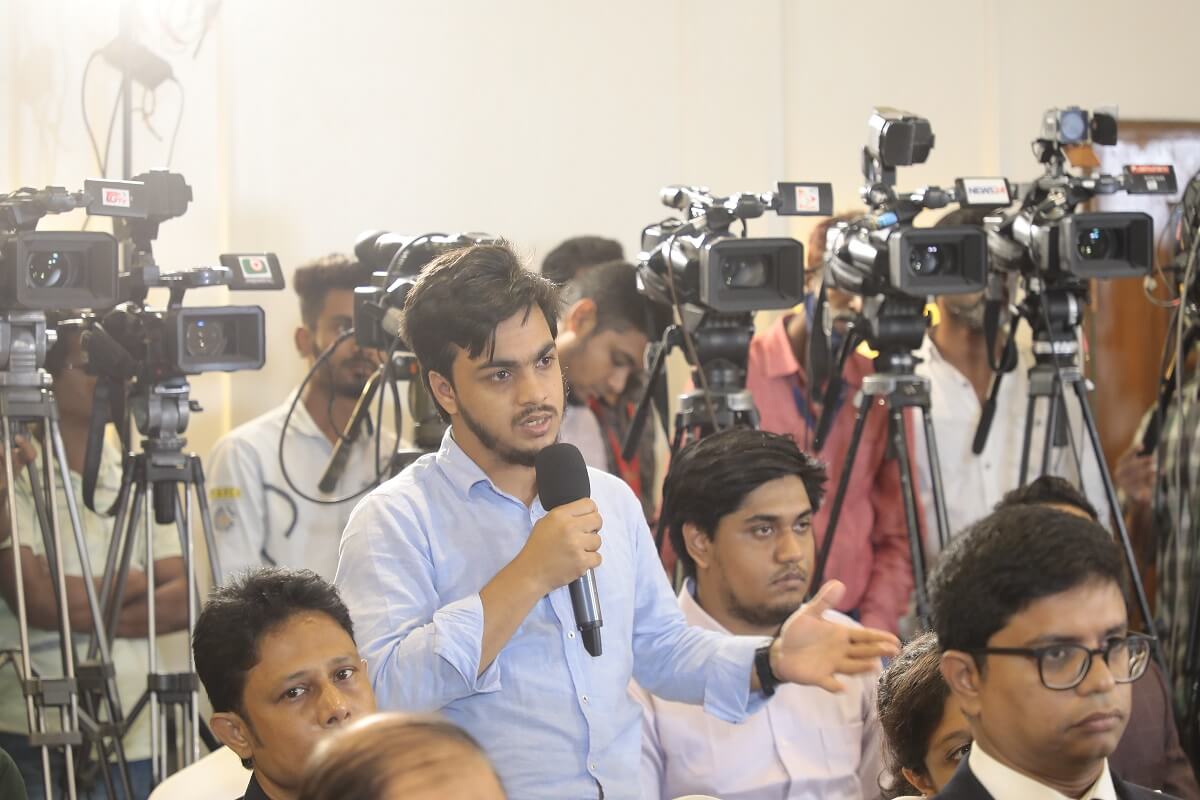
The HC also expressed his pleasure in Bangladesh being able to complete building the Padmna Bridge even after the withdrawal of the World Bank from the project. He believed that great engineering excellence have been achieved through it and it would open up amazing opportunities and bring a whole new region near Dhaka, which is the artery of development in Bangladesh.
The HC also said that observing the good economic flow during both the political parties in the past in Bangladesh is not nearly in a difficult situation as Sri-Lanka, unlike the speculations around. He showed confidence, on the basis of the foreign exchange reserve and also stated that the country has not built up too much debt and economic growth is relatively strong.
Present at the lively question and answer session were esteemed guests such as Former Bangladeshi Ambassador M Shafiullah; Chairman of Bangladesh Kallyan Party, Maj. Gen. Syed M Ibrahim (Retd); Former Minister and Secretary of Jatiya Party, Sheikh Shahidul Islam; Organizing Secretary, AL, Ahmed Hossain; Organizing Secretary, BNP, Shama Obaid, Dr. Muhammad Aminul Karim, Prity Chakrabarty, Mr. Iktedar Ahmed; and many other members of academia and the media who brought forth pertinent questions for the HC to answer.
